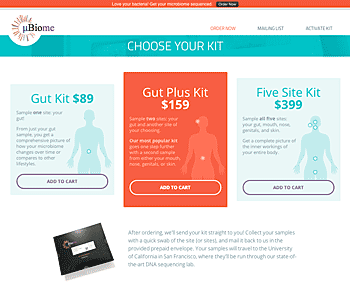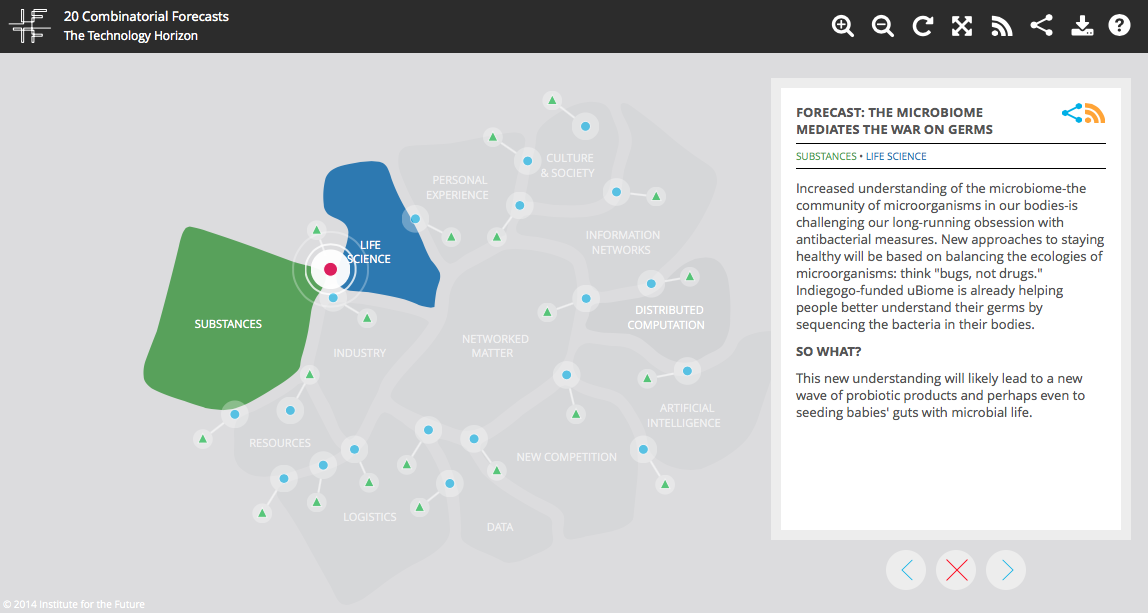Future Now
The IFTF Blog
From #20forecasts: The microbiome mediates the war on germs
Since James Watson and Francis Crick first described the structure of DNA in 1953, the double-helix has provided a blueprint for creating and understanding life. The process, while staggeringly complex, was straight-forward: genes construct proteins, which in turn, provide the building blocks for all of the parts we need. A break-down or abnormality in the genetic chain produced defections or the eventual onset of disease. A genetic disposition in one fashion or another therefore greatly impacted an organism’s health.
Today, however, there is a growing body of evidence that shows this may not be the entire story.
While the genetic construct of an organism is incredibly important, one other factor may have an even stronger influence on our health and well-being: bacteria.
The discovery and sequencing of our micro-biological organisms
Over the past decade, the same advances in computing technology that have allowed for the sequencing of DNA have allowed equally for the discovery and sequencing of the micro-biological organisms that many scientists think could hold the key to transforming the future of medicine. One company, San Francisco based start-up uBiome, is not only pioneering the way collection and analysis of the human microbiome happen, but in the process is hoping to challenge and disrupt the way science is done.
“We’re including all of the stakeholders in our work… scientists, the public, doctors, researchers, sick people, to make sure that research is collaborative and incorporates the wisdom of the crowd into both the hypotheses and conclusions of scientific research,” uBiome co-founder and CEO, Jessica Richman said in interview.
 To do this, uBiome is crowdsourcing the collection of the human microbiome, sending kits to thousands of individuals to gather and analyze their unique biological constructs, and determine their correlations to certain types of disease.
To do this, uBiome is crowdsourcing the collection of the human microbiome, sending kits to thousands of individuals to gather and analyze their unique biological constructs, and determine their correlations to certain types of disease.
“The microbiome allows us to take a new approach to product development, drug discovery, disease investigation and healthcare by creating probiotic, rather than antibiotic solutions.”, said Richman. “We’re hoping to leverage the power of the crowd to make those advances, and in the process, we’re allowing, for the first time, access to the public, the ability to sequence their microbiome and become involved in scientific research.”
Pulling from innovations across a wide array of technologies, the company is using next generation sequencers from Illumina, Amazon Web Services, Hadoop, machine learning, advanced statistical techniques, robots, and proprietary technologies to manage their operations and draw insights from the vast range of data they’ve gathered from thousands of samples.
“Next generation sequencing is a powerful technology, as important as the invention of the microscope, allowing us to see all of the bacteria and other organisms in our bodies, and our world. With these discoveries, we can take a new approach to scientific research, translational medicine, and the future of healthcare.”
“Instead of fighting pathogens we can encourage the growth of a garden of beneficial organisms,” she adds.
Prominent researchers from across academia agree with Richman. “Germs make us sick, but everyone focuses on the harm. And it’s not that simple, because without most of these organisms we could never survive,’’ says Marti Blaser of NYU’s School of Medicine in a 2012 New Yorker article. “The prospects here are endless,’’ he points out. “We need to be careful with the science and not oversell it. But I have been a practicing physician and medical researcher for more than thirty years, and this is the most exciting and important work of my lifetime.”
As advances in technology allow for faster and more accurate sequencing of human microbiology, the ability for research to translate into tangible products and treatments, helping individuals stave off conditions they may have a genetic disposition to, or fight diseases they currently face, will likely accelerate. For companies like uBiome, capitalizing on this future lies in not only understanding the world of the microbiome, but sharing it through its ecosystem of partners and colleagues working on everything from cancer treatments to more biologically sound shampoos. Doing so, as Richman believes, could mean not only improvement our understanding of what gets people sick, but unlocking new ways to keep people healthy in ways that were once unimaginable—and in the meantime changing the way science is done.
This post is the 8th in a series exploring IFTF's new interactive map from our Technology Horizons program, 20 Combinatorial Forecasts—featured in FastCompany Co.EXIST's "When Technologies Combine, Amazing Innovation Happens." Every few weeks we'll take a deep dive into another of the map's twenty forecasts on the future of technology at the intersections of different fields.
Curious about the Technology Horizons program?
- Follow the forecasts at @iftf and #20forecasts
- Find out more about the program
- Check out previous years' Technology Horizons research
- Contact Sean Ness ([email protected])




